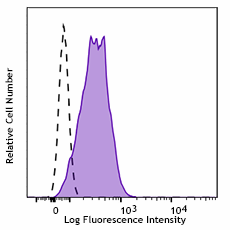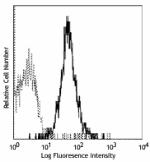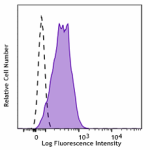- Clone
- Kay-10 (See other available formats)
- Regulatory Status
- RUO
- Other Names
- Fas Ligand, FasL, Apo-1 Ligand, CD95 Ligand
- Isotype
- Mouse IgG2b, κ
- Ave. Rating
- Submit a Review
- Product Citations
- publications

-

Mouse FasL transfected cell line stained with CD178.1 (FasL) (clone Kay-10) purified (filled histogram) or mouse IgG2a, κ purified isotype ctrl (open histogram) followed by anti-mouse IgG2 biotin and streptavidin PE.
| Cat # | Size | Price | Quantity Check Availability | Save | ||
|---|---|---|---|---|---|---|
| 106809 | 100 µg | 216€ | ||||
| 106810 | 1 mg | 542€ | ||||
CD178.1 is a 40 kD Fas ligand alloantigen (designated as mFasL.1) expressed on the activated T lymphocytes, testis, and eye of selected mouse strains including C57BL/6, C3H, MRL, NOD, NZB, NZW, and SJL. It does not react with lymphoblasts from BALB/c, DBA/1, or DBA/2 mice. CD178.1 is upregulated in activated T cells upon TCR re-engagement and has been shown to induce autocrine and paracrine T cell death. CD178 expression in the eye and testis has been shown to participate in immune privilege at these sites. Functional studies suggest that mFasL.2 has higher specific activity than mFasL.1. CD178 can be cleaved from the surface by metalloproteases, and "soluble" CD178 may block the activities of membrane-bound CD178. CD178 binds to CD95 (Fas) to induce apoptotic cell death implicated in the maintenance of peripheral tolerance. CD178/CD95 interactions have been implicated in the proliferation of CD8+ cells and neutrophil extravasation, chemotaxis, and survival. The Kay-10 antibody has been reported to block CD178.1/CD95 induced apoptosis in cells derived from mice expressing this alloantigen.
Product DetailsProduct Details
- Verified Reactivity
- Mouse
- Antibody Type
- Monoclonal
- Host Species
- Mouse
- Immunogen
- C57BL/6 mouse FasL cDNA-transfected L5178Y cells
- Formulation
- 0.2 µm filtered in phosphate-buffered solution, pH 7.2, containing no preservative.
- Endotoxin Level
- Less than 0.01 EU/µg of the protein (< 0.001 ng/µg of the protein) as determined by the LAL test.
- Preparation
- The Ultra-LEAF™ (Low Endotoxin, Azide-Free) antibody was purified by affinity chromatography.
- Concentration
- The antibody is bottled at the concentration indicated on the vial, typically between 2 mg/mL and 3 mg/mL. Older lots may have also been bottled at 1 mg/mL. To obtain lot-specific concentration and expiration, please enter the lot number in our Certificate of Analysis online tool.
- Storage & Handling
- The antibody solution should be stored undiluted between 2°C and 8°C. This Ultra-LEAF™ solution contains no preservative; handle under aseptic conditions.
- Application
-
FC - Quality tested
- Recommended Usage
-
Each lot of this antibody is quality control tested by immunofluorescent staining with flow cytometric analysis. For flow cytometric staining, the suggested use of this reagent is ≤ 0.25 µg per million cells in 100 µL volume. It is recommended that the reagent be titrated for optimal performance for each application.
- Application Notes
-
Additional reported applications (for the relevant formats) include: in vitro blocking1,2 and in vivo blocking3-5, and immunohistochemical staining6 of formalin-fixed paraffin-embedded tissue sections. Fas Ligand is expressed at low density on activated cells. For most successful immunofluorescent staining results, it may be important to maximize signal over background by using a relatively bright fluorochrome-antibody conjugate (Cat. No. 106806) or by using a high sensitivity, three-layer staining technique (e.g., including biotinylated anti-mouse IgG (Cat. No. 405303) second step , followed by SAv-PE (Cat. No. 405204)). The Ultra-LEAF™ purified antibody (Endotoxin <0.01 EU/µg, Azide-Free, 0.2 µm filtered) is recommended for functional assays (Cat. No. 106809 and 106810).
- Application References
-
- Kayagaki N, et al. 1997. P. Natl. Acad. Sci. USA 94:3914.
- Kobata T, et al. 1997. Immunology 92:206.
- Hattori K, et al. 1998. Blood 91:4051.
- Takeda Y, et al. 1998. Diabetologia 41:315.
- Kim YH, et al. 1999. Eur. J. Immunol. 29:455.
- Takeda Y, et al. 1998. Diabetologia 41:315.
- RRID
-
AB_2819812 (BioLegend Cat. No. 106809)
AB_2819813 (BioLegend Cat. No. 106810)
Antigen Details
- Structure
- TNF superfamily Fas ligand alloantigen, 40 kD
- Distribution
-
Activated T cells, spleen, testis, eye of some selected mouse strains (C57BL/6, C3H, NZB, NZw, MRL)
- Function
- Induces apoptosis
- Ligand/Receptor
- Fas (CD95)
- Cell Type
- T cells, Tregs
- Biology Area
- Apoptosis/Tumor Suppressors/Cell Death, Cell Biology, Immunology, Neuroscience
- Molecular Family
- CD Molecules
- Antigen References
-
1. Barclay A, et al. 1997. The Leukocyte Antigen FactsBook Academic Press.
2. Nagata S. 1999. Annu. Rev. Genet. 33:209.
3. Takahashi T, et al. 1994. Cell 76:969.
4. Hill LL, et al. 1999. Science 285:898.
5. Kayagaki N, et al. 1997. P. Natl. Acad. Sci. USA 94:3914. - Gene ID
- 14103 View all products for this Gene ID
- UniProt
- View information about CD178.1 on UniProt.org
Related FAQs
- Do you guarantee that your antibodies are totally pathogen free?
-
BioLegend does not test for pathogens in-house aside from the GoInVivo™ product line. However, upon request, this can be tested on a custom basis with an outside, independent laboratory.
- Does BioLegend test each Ultra-LEAF™ antibody by functional assay?
-
No, BioLegend does not test Ultra-LEAF™ antibodies by functional assays unless otherwise indicated. Due to the possible complexities and variations of uses of biofunctional antibodies in different assays and because of the large product portfolio, BioLegend does not currently perform functional assays as a routine QC for the antibodies. However, we do provide references in which the antibodies were used for functional assays and we do perform QC to verify the specificity and quality of the antibody based on our strict specification criteria.
- Does BioLegend test each Ultra-LEAF™ antibody for potential pathogens?
-
No, BioLegend does not test for pathogens in-house unless otherwise indicated. However, we can recommend an outside vendor to perform this testing as needed.
- Have you tested this Ultra-LEAF™ antibody for in vivo or in vitro applications?
-
We don't test our antibodies for in vivo or in vitro applications unless otherwise indicated. Depending on the product, the TDS may describe literature supporting usage of a particular product for bioassay. It may be best to further consult the literature to find clone specific information.
Other Formats
View All CD178.1 Reagents Request Custom Conjugation| Description | Clone | Applications |
|---|---|---|
| LEAF™ Purified anti-mouse CD178.1 (FasL) | Kay-10 | FC |
| PE anti-mouse CD178.1 (FasL) | Kay-10 | FC |
| Ultra-LEAF™ Purified anti-mouse CD178.1 (FasL) | Kay-10 | FC |
Compare Data Across All Formats
This data display is provided for general comparisons between formats.
Your actual data may vary due to variations in samples, target cells, instruments and their settings, staining conditions, and other factors.
If you need assistance with selecting the best format contact our expert technical support team.
-
LEAF™ Purified anti-mouse CD178.1 (FasL)
_Antibody_1_FC_090407.jpg&Width=150&altFmImage_path=&Crop=5)
Mouse Fas Ligand transfected cells stained with LEAF™ purifi... -
PE anti-mouse CD178.1 (FasL)

Mouse Fas Ligand transfected cells stained with Kay-10 PE -
Ultra-LEAF™ Purified anti-mouse CD178.1 (FasL)

Mouse FasL transfected cell line stained with CD178.1 (FasL)...
 Login / Register
Login / Register 









Follow Us